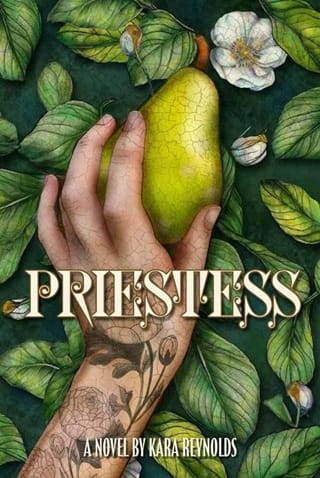34. Watching
Clean and smelling fresh, we made our way to the dining hall to join Quinn and River.
I explored the two entrances on the stairwell landing next to Alric’s quarters and saw how short of a walk I was to their new dormitory.
We passed other officers’ wives and female staff in the black cotton clothing.
I changed into my black dress.
I collected the journal, the key, the comb and the hagstone from Helena, as well as my vials of lightleaf and lavender oil, and placed the hagstone in my pocket and the rest in Alric’s room before we walked down to the dining hall.
“What is that book?”
she asked as we walked.
I shrugged.
“I found it in the wall in the littler dormitory.
It’s a journal.
I don’t know why it interests me, but it does.
It seems very old.”
“And the key and the hagstone?”
“The key was in the journal.
I found the hagstone in Nyossa.”
I did not tell her of the self-stacking pebbles or the dreams I had.
“And the comb? We have better combs and brushes now in our dormitory.
Do you need one? Does the captain not have anything in his room?”
“To tell you the truth, I was so tired after the ceremony, I just slept.
I have not explored it.”
I do not know why I was evading explaining that Alric had put that comb in my hand as I slept shackled to the chain in Nyossa.
Helena nodded.
“Oh I know.
I was thinking you have not been able to sleep without your windows.
Poor thing.
Does the captain’s room have windows?”
“It does.
And thank you for collecting my things,” I said.
She had a wistful look on her face.
“We none of us have any ‘things’ anymore.
It is a small complaint, but all I can think of are my brushes and my pen nibs and my inks.
All of the pages I was not finished illuminating.
All of our dresses and boots and my father’s books.
All gone.
Why am I thinking of smallnesses?”
To say that she was thinking of small things because it was easier than to think of the large things we had lost was on the tip of my tongue.
But I refrained and said, “I miss my books.
They each cost a fortune and I doubt I can get them here in Pikestully.”
“The Shark’s Keep has a scriptorium for obvious reasons,”
she began.
“They’re not an illiterate people, but they only have a few printing presses in the entire country.
I asked Zinnia.”
“Please tell me they're in the capital city.”
“Thank Agnes.
But I do not yet know that we can afford books on our salaries.”
“Alric has books in his room.
Just a few.
I will look at them tonight.”
She put her hand on my arm and drew us back behind the others.
We were nearing the dining hall, the smells of bread and herbs in the air.
“How was he? When you got back to the rooms, did he… try anything?”
“No.
He said he has never touched a woman without her allowance.
He said he was going to sleep in the infantry barracks.
I would think he will come collect things he needs, occasionally.
And then he said ‘I will you treat you as my lawful wife in public.
I will not shame you and I hope you will not shame me.’ And I said I wouldn’t.
I told you, he does not want me that way.
Well, not enough.”
“What do you mean ‘not enough,’ Edie?”
I hesitated.
“I mean— don’t think me conceited.”
“Please speak plainly.
It is your oldest friend to whom you speak.”
I sighed.
“I see him look at me.
At my body.
And sometimes my mouth.
But he always looks away.
I think, this is strange to say, he is ashamed of finding me… desirable.”
“That is absurd.
Why would he be ashamed of that?”
“I don’t know, but he is not a brute and for that I am grateful.”
I paused and then turned to her, our privacy disappearing as we entered the hall, and said, “I do not think his sergeant a brute either.”
She was silent.
“I’m not prying,” I said.
“You are,”
she said, but without rancor.
“I accepted his proposal for Maureen.
She needs protection.
More than I can give.
And I think he will do that for us.”
I nodded.
“I agree.
He does seem… enamored by your beauty.”
She turned to me.
“Next winter will be my thirty-ninth.”
“As it will mine.
What are you saying? I hope it is not that we are old.”
Helena made a dismissive noise with her tongue and teeth.
“No.
I am not saying—”
“Well, why do you think he asked you and not Mischa or Catrin?”
She blinked, as if she had not considered it.
“Well, how can I know that?”
“If he tells you, please repeat the reason to me.”
She pursed her lips.
“You are always watching everyone else and making up ideas.”
“I am a woman of ideas.”
“Oh, yes, we all know that,”
she said, waving her hand around the dining hall.
But she turned to me with a softness.
“Truly, you saved us all in that chapel.”
My response was interrupted by Beryl approaching Catrin and collecting her to have an introductory breakfast with the queen in her chambers.
We ate our meals quietly, all wondering how our first day as Tintarians would go.
One of Zinnia’s women, in her black dress and leather apron, visited our table.
She introduced herself and bade Helena and Maureen come with her as she would take them to the throne room to assess how the mural could be restored.
As they walked away, I could hear her explaining how Hinnom had a large chamber on his floor of the keep that he used for kingdom business and that he would allow them the throne room and that he was thrilled it was being repainted.
A young infantryman arrived to escort Mischa to the army offices.
A slender man in cerulean blue came for River and Quinn to guide them to the sea temple to meet with Archpriestess Thalia and begin their scribe duties.
I was alone.
I looked around at the vastness of this room, full of people of different rank and circumstance, from commoner to royalty.
Again, grateful for the food, thinking I could never forget the jerky and singular meals of our Nyossa journey, I finished every bit of the shellfish creatures on my plate, their name I did not know.
At the end of the long table, more women in the keep staff black sat and they eyed me, not with the directness of the Lady Vinia, but with some interest.
I gave them a friendly nod and smile and they gave me their own nods and smiles.
Their eyes were on my left hand and forearm and the tattoos there.
Word and description of Alric’s captive-made-wife had, as River had predicted, likely got out, but I felt no sense of acrimony.
They were interested.
I gathered that my new husband, while not nobility or a general of any of the three armies, was known in this fortress of sea and rock.
It made me think of my first marriage.
I knew what it meant to marry a man of some notoriety.
When Thrush, the handsome second son of a wealthy lord of Perpatane, his father’s estate having both a gold and a silver mine, a lord close to our king and influential, showed interest in me, the daughter of a middling priest in Apollon, of no nobility, no wealth, people talked.
My parents had been elated.
My mother, always concerned with the impropriety of my shapelier figure, rightfully suspected this was part of what had lured in Thrush and had happily had two gowns made that nipped in so tightly at the waist I could not breathe.
My father, a pious and preoccupied man, wanted to know my own thoughts on our faith.
I was courted not by just one man, but by my own family and community.
Friends who had flaunted their engagements and marriages were jealous.
Their betrothed and freshly acquired husbands saw me in a new light.
Ormond Thrush was ambitious, he knew the best way to attain power and status in Perpatane was to show a fervor of faith.
He commented to many after our betrothal that he saw the goodness and piety of our saint in me, that my beauty made him want to pray more, that it inspired his convictions.
At nineteen winters, I thought this incredibly romantic.
Because Thrush stood only to inherit a sum of coin upon his father’s passing, he, a plotting man, knew what he was about and carved a place for himself in Apollon court.
He had served four winters in Perpatane’s army and been decorated.
For what, I did not know as our country had not been in any war while I was alive.
But he had made friends in high places.
And soon, he was regarded as a wise strategist, a wit, a secret-keeper and one to know.
Around the time I had left him, he was a regular confidant of the king and his court.
It occurred to me, for the first time, to wonder if he lived.
Had he been in Eccleston on the scriptorium’s street that day and if he had, was he alive? Had Tintarian infantrymen cut him down? Had my new husband killed my former one?
 Fullepub
Fullepub 



